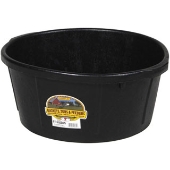posted 12 years ago
Hi,
A week on - I have asked a few people to identify the bushes and noone can (they may be New Zealand natives), but most of them are shiny-leaved ever-greens which I said to be usually dangerous, so I have kept them away for almost a week now. We noticed that one old doe in particular looks very thin in the ribs and back-bone, though she always has a fat stomach. We have been tethering them round the yard and orchard where there is lush overgrowth, and I have noticed for the last few days her stool is still lose to soft and bright green. Am wondering about coccidosis, but I have seen no blood. We are only getting a tablespoon or so out of her, and about a cup morning and evening from the younger one - the younger one seems to be increasing production a bit.
I have also done the following:
- Given them fennel and fenugreek seeds. Both ate it eagerly for a few days, and then only the young greedy one
- Given them powdered kelp extract. Only the old doe at it, but she ate HEAPS for a few days and then no much now
- Given them pumpkin seeds. The old doe took one mouthful, then refused any more. The young greedy one will eat more. (Neither will eat raw pumpkin)
The older one was our best milker, so we may have taken more out of her in general. They have raised five kids between them, and then two calves (milking twice a day, then dropped back to once a day) and kept us in milk and some cheese. We gave them some corn when pregnant to keep them tame, but for the past few months they have only had pasture feeding.









 They did get out a couple times, and I'm pretty sure they ingested some of the azaleas. Symptoms were disorientation, bloat, head pressing... it was pretty scary. The second link is about azalea toxicity in goats. If this is what your feeding them, it can be fatal. The second link will be helpful for quick reference if you think this is what you are dealing with. Good Luck!
They did get out a couple times, and I'm pretty sure they ingested some of the azaleas. Symptoms were disorientation, bloat, head pressing... it was pretty scary. The second link is about azalea toxicity in goats. If this is what your feeding them, it can be fatal. The second link will be helpful for quick reference if you think this is what you are dealing with. Good Luck!























